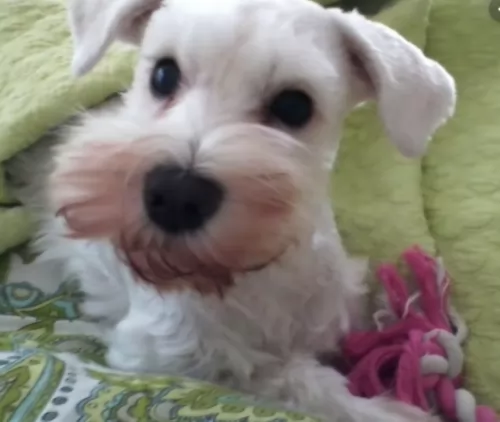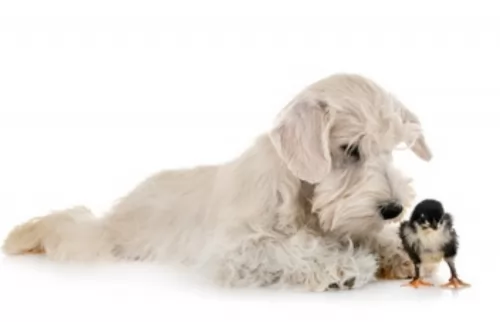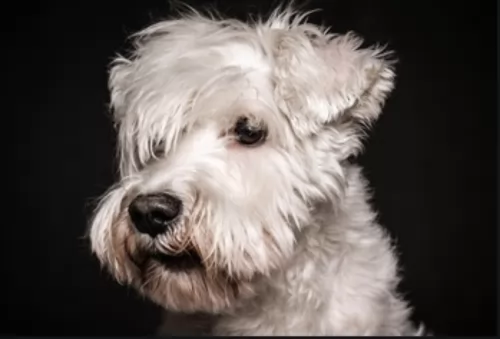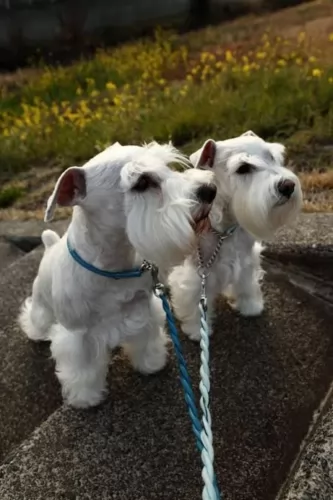 Petzlover
PetzloverAussie Poo is originated from United States but White Schnauzer is originated from Germany. Aussie Poo may grow 24 cm / 10 inches higher than White Schnauzer. Aussie Poo may weigh 23 kg / 51 pounds more than White Schnauzer. Both Aussie Poo and White Schnauzer has almost same life span. Aussie Poo may have less litter size than White Schnauzer. Both Aussie Poo and White Schnauzer requires Moderate Maintenance.
Aussiepoo is a hybrid breed mix of purebred Poodle and Australian shepherd. If one of the parents is miniature Poodle, the Aussiepoo will be smaller than usual - mini Aussiepoo. We do not know precisely their origin, but we know that this beautiful mix is originating from USA, Australia and Canada.
Breeders can't really know how pups are going to look like until they are born. No one actually can control the combination of the genes. Usually, Aussiepoo is silky-fur playable and friendly dog, and that is always more than enough for Aussiepoo lovers.
 The White Schnauzer was established in Germany in 2006 for people looking for this particular breed of dog but in white.
The White Schnauzer was established in Germany in 2006 for people looking for this particular breed of dog but in white.
The traditional color is salt and pepper. It seems that breed societies don’t allow the white breed, saying they don’t conform to the ideal breed standard.
The White Schnauzer is officially recognized in Germany, If you have a White Schnauzer you may not be able to show him with some of the major kennel clubs.
White is one of the four color varieties of the Miniature Schnauzer and it is also recognized by the Fédération Cynologique Internationale.
Every Aussiepoo depends on the size of the Poodle that was bred. If the parents are smaller than usual, the puppies will be smaller. Their colour also depends on the colour of the parents, and a litter can have puppies of a different colour. Their bodies are usually very muscled, with strong bones, but if you are not an outdoor type, there is a chance that your Aussiepoo will be obese. They are very active and they need a well-balanced diet.
These dogs are easy to train since they are intelligent and people oriented and you can train them while they are still puppies. Aussiepoo is generally friendly with strangers, always ready to play with children and they get along with other pets and animals. This breed is very affectionate and they like their humans to be close so it’s not recommendable to raise them to be loners.
 There are a number of different types of White Schnauzer. The white Schnauzer is actually one of 4 color varieties and these dogs are always miniature Schnauzers.
There are a number of different types of White Schnauzer. The white Schnauzer is actually one of 4 color varieties and these dogs are always miniature Schnauzers.
You won’t easily find a Standard- or Giant dog in white. They aren’t albinos, as the skin does have some pigment.
These dogs also have that square-shaped build and they stand between 28 to 36 cm in height and weigh between 4 and 7kg.
The coat is wiry with a soft undercoat. The ears are often cropped to stand erect, but if left they are half-erect, half-floppy and fold forward.
The White Schnauzer is an intelligent dog who will be able to be socialized and trained easily.
He is an energetic little dog and very playful and will get along well with children, loving the games they provide and loving to spend time with all members of his family.
He is loving and affectionate and is willing to share his home and people with other dogs too. He will make you a good watchdog, perhaps encouraged because of his reserve with strangers.
If you provide him with the right amount of mental and physical stimulation, he can become a balanced dog with an amicable personality.
Aussiepoo is a friendly kind. They are always ready to run and play with children, and they will tend to keep the children together (genes of the Australian shepherd). They are so playful that they will see no difference between an infant and a five-year-old, so be present if there are small children unstable to walk alone.
Except the fact that they love water and that they are great swimmers, they have many agility talents.
Since Aussiepoo is a loving, caring and sweet kind of dog, they will fit in anywhere you take them.
They are super friendly with strangers, and that can be an issue if you don’t keep an eye on them. But, they should never be left alone, or leash free outdoors. They are not so good as a guard dog, so if you tend to keep him inside with stay-at-home family member, this breed if no a good choice.
They generally learn quickly. Therefore, they are easy to train. They respond better to the prize training methods.
 The White Schnauzer is such an adaptable little dog and he will happily adapt to life in the city or in the countryside, just so long as he is close to his human companions and gets sufficient exercise.
The White Schnauzer is such an adaptable little dog and he will happily adapt to life in the city or in the countryside, just so long as he is close to his human companions and gets sufficient exercise.
He is a sociable dog that just loves to be around his human family and won’t like to be separated from them for too long.
He makes a great family dog when you provide him with the right food, a warm dry place to sleep, exercise and lots of love and attention.
Risk of: eye cataracts, hip dysplasia (malformation of the ball and socket joint), epilepsy, progressive retinal atrophy (degeneration of the retina cusing progressive vision loss culminating in blindness), sebaceous sdenitis (an inflammatory skin disease that affects the skin glands), bloat, nasal solar dermatitis (sun sensitivity).
Pelger - Huet syndrome (abnormalities in blood cells. PHA testing is advised with this dog breed. PHA is inherited and dangerous only if both parents carry this abnormality.)
Von Willebrand's Disease (inherited bleeding disorder caused by a deficiency in the amount of a specific protein needed for blood clotting. It can be detected by buccal mucosal screening.)
 While he is a spunky, robust type of dog, there are always going to be some health concerns to look out for.
While he is a spunky, robust type of dog, there are always going to be some health concerns to look out for.
Kidney stones may well not cause your pet the same pain that humans endure, but they are still a cause for concern. A kidney stone that gets too large and lodges in the ureter becomes a ureterolith. This can be very painful, resulting in pain and even vomiting.
The kidney can even swell and become damaged. Your dog could become critically ill, particularly because of the disrupted flow of urine.
Your pet will possibly have blood in the urine, fever, lethargy, poor appetite and weight loss. Veterinary-intervention will be imperative.
It would be great to establish a feeding routine while the Aussiepoo is still a puppy. The best advice is to feed them three times a day, with the last meal around 5 p.m. After they finish their meal, leave them for a while. Make sure to feed your puppy with high-quality food rich in nutrients, and follow the recommendation of the dosage of the food. Avoid cheap dog food and addition meals.
Once you made a healthy feeding habit and your Aussiepoo is 6 months old, they won’t need three meals per a day. Leave the meal set for the morning and the one set for the evening. Avoiding night meals is a must. Don’t start any activity with the dog right after the meal. Make sure your dog has plenty of fresh water.
Activity, outdoor games, nutritional and balanced meals are the key for an Aussiepoo.
This breed is extremely intelligent. Since they are easy to train, you will be able to take them with you anywhere you go. They love to play in the water, but make sure they are not exposed to the sun for too long. They like smart games, mentally challenging, and they will be very playful with other dogs.
 He is a low shedding breed so he will require a brushing just once a week. These dogs also have a certain professional grooming cut. Some schnauzer dog owners do stripping but this is mostly for show dogs.
He is a low shedding breed so he will require a brushing just once a week. These dogs also have a certain professional grooming cut. Some schnauzer dog owners do stripping but this is mostly for show dogs.
Most people just have them sheared to make it easy to groom them. Whether stripped or clipped, they nearly always have a beard and bushy eyebrows.
Trim your pet's nails and give him a general once-over during the grooming sessions to ensure all is well.
You White Schnauzer relies on you to make wise food choices for him. He will eat most things you offer him. That doesn’t mean you should as you can cause him to have a whole lot of digestive problems.
If you choose to give him commercially manufactured dog food, make sure its a high-quality one – devoid of toxic ingredients such as colorants, fillers and preservatives.
If you don’t know how to choose, your vet can show you the foods they have in stock and which would suit your pet best.
A little bit of home-made food now and then can also be good, but the food needs to be plain and simple to avoid abdominal pain. Boiled chicken brown rice and vegetables chopped up and added to the dry kibble occasionally can be a very good choice.